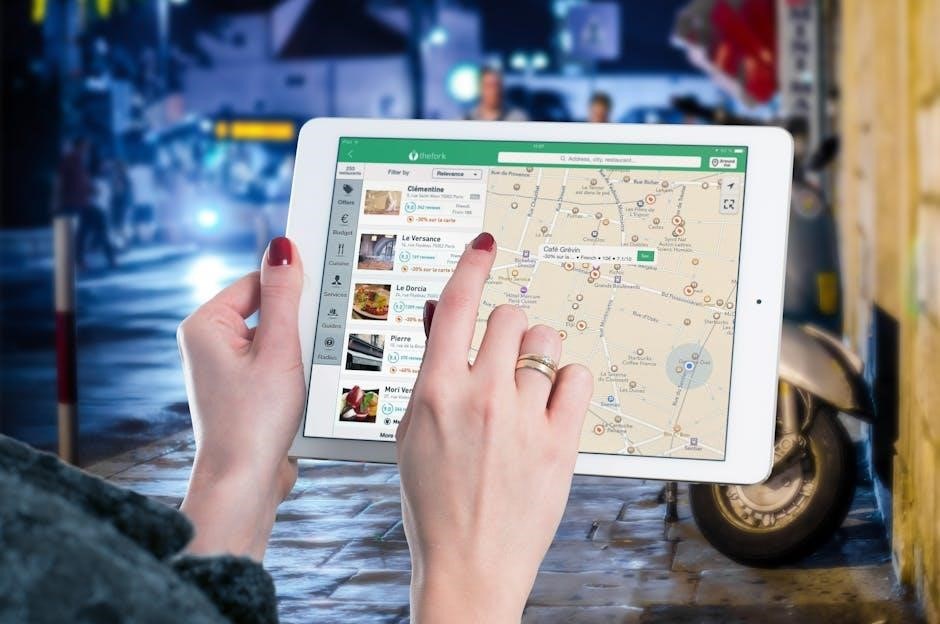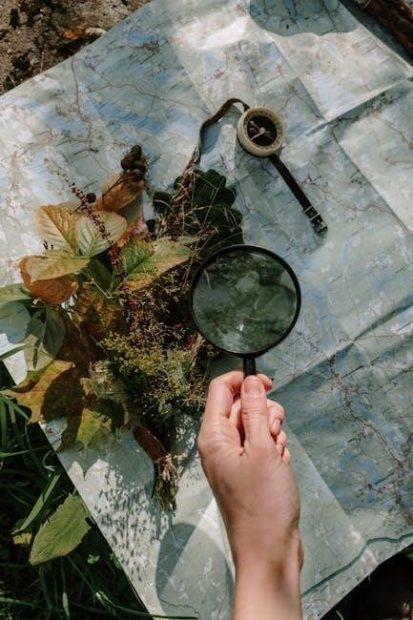Definition of a Guide
A guide is both a noun and a verb, representing someone who leads or directs others, or the act of assisting movement, respectively.
1.1. Noun: A Person Who Leads or Directs
A guide is a person employed to lead or direct others, often in unfamiliar territories or activities. They may serve as experts, such as tour guides, who explain points of interest, or mentors offering advice. Guides ensure safety and clarity, helping individuals navigate complex situations or environments. Their role is essential in providing direction, whether physical, like a safari guide, or metaphorical, like a career mentor. Essentially, a guide is a trusted figure who assists others in reaching their destination or achieving their goals, making their journey smoother and more informed. Their expertise and leadership are invaluable in various contexts.
1.2. Verb: To Assist or Direct Movement
To guide means to assist or direct the movement of someone or something, ensuring they reach a destination or achieve an objective. This can involve physical steering, like guiding a vehicle, or metaphorical direction, such as advising on decisions. Guiding often implies leadership, expertise, or familiarity with the subject matter. For example, a mentor guides a mentee through career choices, while a pilot guides a plane safely to its destination. The act of guiding requires clear communication, patience, and a deep understanding of the path or process involved. It is a fundamental action that fosters progress and clarity in various situations.
Historical Context of Guides
Guides have played a crucial role throughout history, aiding explorers, traders, and travelers in navigating unknown territories and fostering cultural exchange since ancient times;
2.1. Ancient Civilizations and Exploration
In ancient times, guides were essential for navigating uncharted lands, facilitating trade, and leading military campaigns. They possessed deep knowledge of geography, climate, and local customs, ensuring safe passage and successful endeavors. Early explorers relied on indigenous guides to discover new territories, highlighting their critical role in expanding empires and cultural exchange. The expertise of these guides laid the foundation for future exploration, demonstrating their invaluable contribution to history’s progression. Their legacy continues to inspire modern guiding practices, emphasizing adaptability and local insight.
2.2. Evolution of Guides in Modern Times
Modern guides have evolved significantly, adapting to technological advancements and diverse needs. Digital platforms now offer virtual guides, while GPS navigation aids travelers in unfamiliar regions. The rise of tourism has specialized guides, such as eco-tourism and adventure guides, catering to niche interests. Additionally, AI-powered virtual assistants provide real-time information, enhancing the guiding experience. Despite these innovations, human guides remain indispensable, offering personalized insights and local expertise. The blending of tradition with technology ensures guides continue to play a vital role in exploration and education, making them indispensable in today’s fast-paced, interconnected world.

Types of Guides
Guides can be human experts offering localized knowledge or digital tools providing real-time navigation and information, catering to diverse needs in travel and exploration.
3.1. Tour Guides: Experts in Local History and Culture
Tour guides are professionals who specialize in sharing detailed insights about a region’s history, cultural heritage, and landmarks. They often possess extensive knowledge, gained through formal education or years of experience, allowing them to provide engaging narratives that enrich visitors’ experiences. Whether leading groups through historic sites or explaining local customs, their expertise helps travelers connect deeply with the area. Their role extends beyond mere navigation, as they act as storytellers, ensuring that each tour is both informative and memorable. This makes them invaluable assets for anyone seeking an authentic understanding of a place.
3.2. Wilderness Guides: Specialists in Outdoor Adventures
Wilderness guides are experts in outdoor environments, leading adventurers through remote and challenging terrains. They specialize in survival skills, navigation, and environmental knowledge, ensuring safe exploration of nature. These guides often possess deep understanding of local ecosystems, wildlife, and weather patterns, enabling them to handle emergencies effectively. Their role combines physical stamina, practical expertise, and the ability to educate visitors about natural wonders. Whether hiking, camping, or rafting, wilderness guides enhance the experience by sharing insights and ensuring safety, making them indispensable for those seeking thrilling outdoor adventures in uncharted territories.
The Role of a Guide in Society
Guides fulfill essential societal roles by educating, ensuring safety, and navigating unfamiliar territories, acting as mentors and fostering trust and confidence in various settings.
4.1. Educational and Informative Functions
Guides play a crucial role in educating individuals by imparting knowledge about history, culture, and environments. They provide detailed insights, making complex information accessible and engaging for learners. Whether in academic settings or exploratory excursions, guides ensure that participants gain a deeper understanding of the subject matter. Their ability to convey information clearly and effectively fosters a learning environment that is both enlightening and memorable. This function not only enriches knowledge but also encourages curiosity and appreciation for diverse topics. Through their expertise, guides empower others with valuable insights and perspectives.
4.2. Safety and Navigation in Unfamiliar Territories
Guides are essential for ensuring safety and navigation in unfamiliar areas, particularly in wilderness or high-risk environments. They possess expertise in map-reading, hazard assessment, and emergency response, minimizing risks for individuals. By providing clear directions and warnings, guides help navigate challenging terrains, ensuring groups stay on course. Their knowledge of local conditions, such as weather patterns and potential dangers, is vital for preventing accidents. This role not only protects travelers but also builds confidence, allowing them to explore securely. The guide’s ability to manage risks ensures a safe and successful journey through unknown territories. Their presence is often the difference between safety and uncertainty.
Guides are indispensable in safeguarding individuals in unfamiliar regions, ensuring their well-being and successful navigation. Their expertise in handling emergencies and understanding the environment is crucial for maintaining safety. By offering reliable guidance, they help individuals traverse uncharted areas with confidence and security, making their role invaluable in exploration and travel. The guide’s commitment to safety ensures that adventures remain both exciting and secure, fostering trust and reliance among those they lead. Ultimately, their navigational skills and protective measures guarantee a safe and memorable experience for everyone involved.

Psychological Impact of Guiding
Guiding fosters trust, confidence, and personal growth, transforming individuals through mentorship and support, while reducing anxiety by providing reassurance in unfamiliar situations.
5.1. Mentorship and Personal Growth
Guiding often serves as a powerful form of mentorship, fostering personal growth by providing guidance, reassurance, and expertise. A guide not only directs individuals through unfamiliar territories but also empowers them to navigate challenges independently. Through shared experiences, trust and confidence are built, enabling individuals to step out of their comfort zones. This transformative process strengthens self-belief and resilience, allowing people to achieve their goals and develop new skills. The psychological impact of guiding extends beyond mere direction, creating a lasting influence on personal development and self-discovery.
5.2. Building Trust and Confidence
Trust and confidence are foundational to the guiding relationship. A guide’s expertise and reliability create a safe environment for individuals to rely on their leadership. Through consistent support and clear communication, guides help alleviate fears and doubts, fostering confidence in their followers. This trust strengthens over time as individuals experience successful navigation of challenges. The guide’s role extends beyond providing directions; it involves instilling a sense of security and self-assurance. By addressing uncertainties and demonstrating competence, guides empower others to embrace new experiences and believe in their own abilities, forming a strong bond built on trust and mutual respect.

Cultural Significance of Guides
Guides hold profound cultural significance as symbols of wisdom, leadership, and tradition. They embody the values of mentorship and directional insight, transcending mere navigation to inspire and educate.
6.1. Symbolism in Literature and Art
In literature and art, guides often symbolize wisdom, leadership, and directional insight. They are portrayed as mentors who illuminate paths, both literally and metaphorically. From the wise wizards in fantasy novels to the navigators in seafaring tales, guides embody the essence of guidance. In art, they are frequently depicted as figures pointing the way, representing clarity in uncertain situations. These symbols reinforce the guide’s role as a source of trust and enlightenment, transcending their practical function to become cultural icons of direction and understanding.
6.2. Guides as Figures of Authority and Wisdom
Guides are often revered as figures of authority and wisdom, embodying expertise and leadership. They possess deep knowledge of their domain, whether cultural, historical, or environmental, making them trusted sources of information. Their wisdom is evident in their ability to navigate complex situations, solve problems, and make informed decisions. As figures of authority, guides command respect, often serving as role models who inspire confidence; Their wisdom transcends mere instruction, offering insights that enrich understanding and foster personal growth. This dual role establishes guides as pillars of trust and reliability in various contexts, from education to exploration.

Technological Advancements in Guiding
Technology has revolutionized guiding through digital tools like GPS navigation and AI-powered virtual guides, enhancing accessibility and efficiency in providing directions and information.
7.1. Digital Guides and GPS Navigation
Digital guides and GPS navigation have transformed traditional guiding methods, offering precise real-time directions and location-based information. These tools enable users to explore unfamiliar territories with ease and accuracy, accessing detailed maps, points of interest, and route optimization. GPS technology provides voice-guided instructions, reducing the need for physical maps. Additionally, digital guides often include interactive features such as user reviews and real-time updates, enhancing the overall experience. This shift has made guiding more accessible and efficient, catering to both tourists and adventurers in an increasingly connected world.
7.2. AI-Powered Virtual Guides
AI-powered virtual guides represent a cutting-edge evolution in guiding technology, utilizing artificial intelligence to provide personalized assistance. These virtual guides leverage data analytics to offer tailored recommendations, real-time information, and interactive support. They can function across various platforms, from mobile apps to voice assistants, ensuring seamless guidance. AI-driven systems enable multilingual support, enhancing accessibility for global users. Additionally, virtual guides can adapt to user preferences, learning from interactions to improve future suggestions. This technology not only streamlines navigation but also enriches experiences, making it an indispensable tool in modern exploration and decision-making, while maintaining the core essence of traditional guiding principles.
Guides play an essential role in navigating life’s journeys, blending tradition with modern innovation to remain vital in an ever-evolving world, ensuring guidance endures for future generations.
8.1. The Timeless Importance of Guides
A guide embodies timeless importance, serving as a bridge between knowledge and experience. From ancient explorers to modern mentors, guides have consistently provided direction and insight, ensuring safe navigation through unfamiliar territories. Their role transcends physical spaces, extending into intellectual and emotional realms, offering wisdom and support. Whether leading travelers through uncharted lands or mentoring individuals in personal growth, guides foster understanding and confidence. Their adaptability to changing times, coupled with a deep-rooted commitment to assisting others, underscores their enduring relevance in society. As the world evolves, the essence of guiding remains a cornerstone of human progress and connection.
8.2. Adapting to the Future While Preserving Tradition
As the world progresses, guides continue to evolve, blending tradition with modern innovation. Digital tools like GPS and AI-powered assistants enhance their roles, offering precise navigation and real-time information. Yet, the essence of guiding—human connection, expertise, and empathy—remains unchanged. Guides today adapt to new technologies while preserving the timeless value of shared knowledge and personal interaction. This balance ensures that the guiding profession remains relevant, bridging the gap between heritage and innovation. By embracing change without losing sight of their core purpose, guides continue to inspire and assist, connecting people to experiences across generations.
